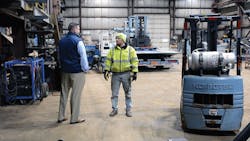“There’s something to be said for building brand awareness, and building awareness of an organization as a veteran-friendly employer, and as a veteran-ready employer.”
So said Saul Newton, Executive Director of the Wisconsin Veterans’ Chamber of Commerce. The trick is figuring out how exactly to do that. That is why the Association of Equipment Manufacturers (AEM) is working with a number of different organizations that focus on getting companies ready to welcome veterans and military family members into their workforce. Recently, AEM hosted a Workforce Development Virtual Summit that included a presentation on how to better recruit and retain veteran talent.
Connecting military veterans in need of quality, family-sustaining careers, who bring unique sets of both soft skills and trade skills, to equipment manufacturers in need of filling vacancies, is a major focus for AEM. Sometimes that effort is simply showing companies where to look; sometimes it’s more complex.
One of the more complex issues can be interpreting a veteran’s resume. Often, resumes from a military veteran will show their “MOS,” or “Military Occupational Specialty.” However, that can require translation.
“I’ll use myself as an example,” Newton said. “I enlisted in the Army. I was an infantryman. My formal job duties, if you were to type in ‘11B’ (11-Bravo) into an MOS translator, would say that ‘this individual was trained to operate weapons systems, communicate, and move tactically.’ If there’s a hiring manager looking at an 11B, they would see someone who has supervised people before, someone who is able to work as part of a team, who can follow instructions, but also work independently and engage creative thinking skills, innovative problem-solving, and work in an austere environment.”
“We talk with companies and help see how they are set up with a veteran coming in for an interview, because they can be very one-dimensional, very crass, perceived as they didn’t have a lot to say,” said Jason Young, president of West Allis, Wisconsin-based Price Erecting Co., himself a former Marine and Army veteran, and advocate for veteran employment. “You have to understand that’s how they’ve been trained: one-word answers, concise, get to the point, and let’s move on.”
One of the skills hiring managers were encouraged to take away from the Workforce Solutions Summit was targeting key groups they know can fill the open positions they have. Veterans are one of those groups that have both the technical and soft skills, as well as leadership potential, to succeed in the physically and mentally challenging careers one finds in manufacturing.
One of the bigger challenges veterans can face is misconceptions and misunderstandings. One such misconception is the prevalence (and result) of military-related health issues, including post-traumatic stress disorder (PTSD).
“The truth of the matter is only a small fraction of military veterans have any kind of combat-related health issue, mental health or otherwise,” said Newton. “The vast majority of military veterans serve their country, and then get out of the military and go on to live highly productive civilian lives. There’s actually data to suggest that veterans are more productive employees than non-veterans, and have lower turnover.”
“A guy being dropped in the middle of the desert, who is 18 or 19 years old, is put into a situation where he can’t go home. If you’re there six to up to 24 months in combat, it’s going to have a profound effect on your emotional and mental capacities,” said Otis Winstead, a U.S. Army veteran and Executive Director of Dryhootch, a Milwaukee-based, nonprofit provider of peer support for military veterans with “Forward-Operating Bases” in multiple cities. “Coming back to the community is something we talk about, having someone who’s already been through that, and having that person walk you back into the community.”
However, veterans of all abilities still provide significant value to any company who brings them on.
“We do have individuals that have physical and mental disability,” said Young, of Price Erecting. “That’s not to say they can’t perform their work or perform what they do on a daily basis. Their physical or mental injuries are more a talking point to discuss further things that may be outside the workplace—maybe a family situation or something like that—versus something where they can’t perform what they do on a daily basis at work.”
“There’s not too many jobs where you sign your life and identity away for a mission and a purpose. Now, if the veteran believes in the mission and purpose, they’re going to give you 120%,” said Levi Marker, a former U.S. Army Paratrooper in Operation Enduring Freedom and a peer support specialist at Dryhootch. “They’re not afraid to start at the bottom and work their way up. They know from their own military experience that everything is performance-based. They also know they can adapt. We’re used to being in situations where you have to ‘figure it out’.”
That ability to improvise, problem-solve, think creatively, and “figure it out” is a key reason to recruit veterans onto a team.
“I kept my Humvee in Afghanistan running with a soda can and bailing wire. We have to improvise,” said Newton. “We have to find creative solutions just to make sure the task gets accomplished. That’s what you’re getting when you see someone with a military background.”
When it comes to strategies to attract veterans into your company, there are some simple ideas to implement, as well as things to keep in mind.
Some of the things employers can do to attract veterans in the near term include:
Create a page on your website specifically welcoming veterans to apply, and showing how your company is “veteran-ready.”
Add a disclosure to your job postings saying veterans and military-affiliated candidates are encouraged to apply.
Veterans listen to veterans: Make use of the veterans already on your staff to get the word out.
Some companies offer a referral bonus to bring veterans in.
Whether interacting with veteran recruits, or veterans already on staff, make sure they are treated as an asset, not a charity.



